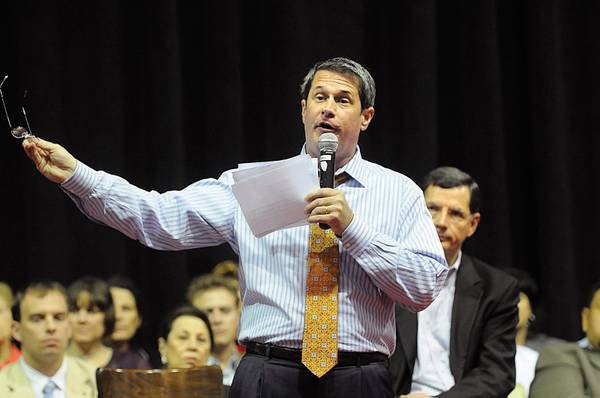Sun Archives
- Radio program implores Asian population to be counted (9-22-2009)
- State to launch Census campaign (9-17-2009)
- Fraternity promoting awareness of census among minorities (7-25-2009)
- Satisfaction survey missed many Hispanics (7-16-2009)
- Counting Nevadans is no small job (1-27-2009)
Sun Coverage
Beyond the Sun
- U.S. Census Bureau
- The Hill: Sen Vitter: Reid wants illegals counted in Census (10-15-2009)
- The Salt Lake Tribune: Commerce boss to Bennett: Too late to change census (10-13-2009)
- Talking Points Memo: Republican Senators Vitter, Bennett Attempt To Force Census To Ask Immigration Status (10-8-2009)
Sen. David Vitter, R-La., and Sen. Robert Bennett, R-Utah, tacked an amendment onto an appropriations bill this month that, if passed, would greatly affect Nevada because of its relatively large Hispanic population.
The amendment would add an 11th question to next spring’s census, a question about “citizenship and immigration status.”
The two senators are trying to ensure that people who aren’t citizens are excluded from figures used for allocating congressional seats, a process that occurs every 10 years, after the census.
Nevada’s growth over the past decade would almost certainly result in the state’s gaining at least one representative in Congress. That growth includes 230,000 illegal immigrants, giving the state the 13th-largest such population in the nation, according to a 2008 Pew Hispanic Center estimate.
Two of the most visible opponents of the amendment are Southern Nevadans in and out of Congress — Senate Majority Leader Harry Reid and Andres Ramirez, senior vice president of NDN, a Washington, D.C., think tank and advocacy group.
Reid tried to use a parliamentary procedure Oct. 13 to prevent the Senate from voting on the measure, but fell short on support.
Rebecca Fisher, spokeswoman for Republican Sen. John Ensign, said the senator has no position on the amendment.
Reid’s spokesman, Jon Summers, said the amendment is “a partisan tactic designed to delay the passage of an important bill.”
Vitter countered on a conservative radio talk show that Reid “wants illegals counted in the census, wants illegals (counted) in the reapportionment of the House,” according to the The Hill, a Beltway publication.
Meanwhile, Ramirez held a news conference Tuesday of 10 national groups opposed to the amendment, including the Hispanic National Bar Association and the NAACP.
In an interview afterward, Ramirez said the Constitution and Supreme Court decisions make clear that congressional seats must be based on a state’s population. He noted that such a question could cause illegal immigrants and their family members to avoid participating in the census for fear that information about them would reach other government agencies.
The result would be an undercount, which not only affects future political representation, but federal funding for roads, schools and other public expenditures, not to mention private sector planning.
An undercount would affect Nevada in particular because a quarter of the state’s population is Hispanic, said David Byerman, Nevada’s chief representative for the Census Bureau. Nevada also has hundreds of thousands of people in so-called mixed-status families, meaning some of their relatives are in the country legally and others aren’t.
But Nevada and other states with large Hispanic populations may wind up not being hurt by the Vitter-Bennett amendment because “it’s too late to shift gears,” Byerman said.
Two congressionally mandated deadlines have come and gone — April 1, 2007, when the agency outlined what subjects the census would cover, and the same date a year later, when the agency released the survey’s 10 questions. “We met both deadlines,” Byerman said.
And the feds have printed 300 million forms. So printing new ones, not to mention reprogramming computers and retraining staff, would cost hundreds of millions of dollars, Byerman said.
Even if Congress wanted to spend additional money, the result would be “the failure of our operation,” he said. “We could not meet statutory deadlines.” One of those is Dec. 31, 2010, the date by which the agency has to submit data to the White House.
To achieve this, the agency needs to get its initial mailing out in late March, followed by a second mailing a month later and door-to-door visits starting May 1, lasting up to eight weeks.
Ramirez noted that census-takers in Nevada have another reason “to be ready to start on time” — higher-than-normal transiency rates as a result of tops-in-the-nation foreclosure rates.


Join the Discussion:
Check this out for a full explanation of our conversion to the LiveFyre commenting system and instructions on how to sign up for an account.
Full comments policy